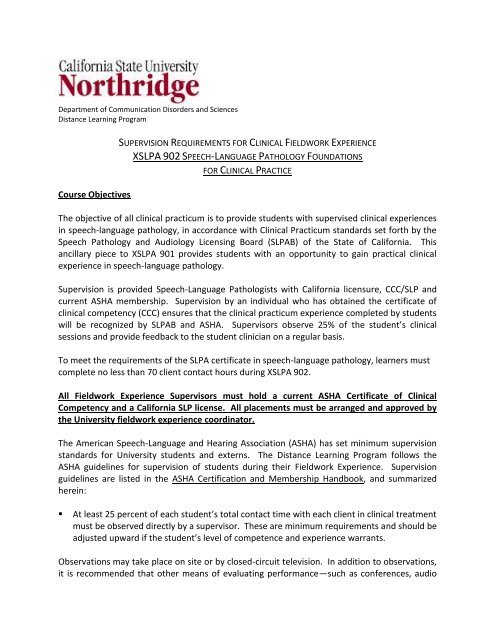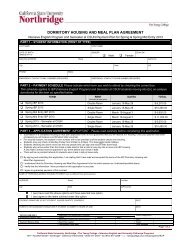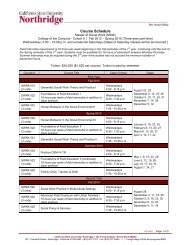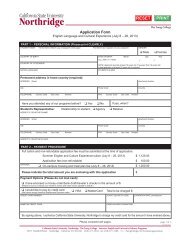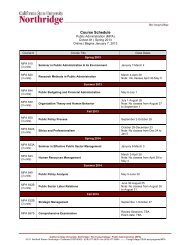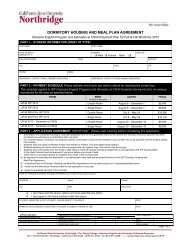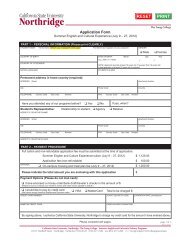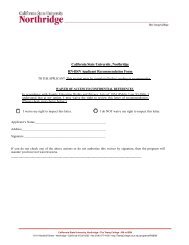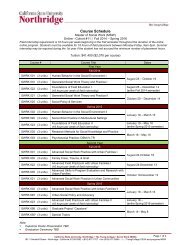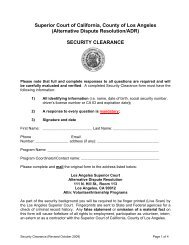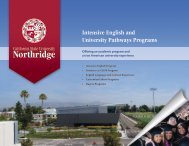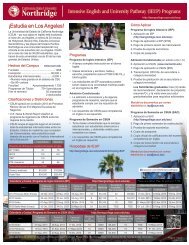this document - Tseng College - California State University, Northridge
this document - Tseng College - California State University, Northridge
this document - Tseng College - California State University, Northridge
You also want an ePaper? Increase the reach of your titles
YUMPU automatically turns print PDFs into web optimized ePapers that Google loves.
Department of Communication Disorders and Sciences<br />
Distance Learning Program<br />
Course Objectives<br />
SUPERVISION REQUIREMENTS FOR CLINICAL FIELDWORK EXPERIENCE<br />
XSLPA 902 SPEECH-LANGUAGE PATHOLOGY FOUNDATIONS<br />
FOR CLINICAL PRACTICE<br />
The objective of all clinical practicum is to provide students with supervised clinical experiences<br />
in speech-language pathology, in accordance with Clinical Practicum standards set forth by the<br />
Speech Pathology and Audiology Licensing Board (SLPAB) of the <strong>State</strong> of <strong>California</strong>. This<br />
ancillary piece to XSLPA 901 provides students with an opportunity to gain practical clinical<br />
experience in speech-language pathology.<br />
Supervision is provided Speech-Language Pathologists with <strong>California</strong> licensure, CCC/SLP and<br />
current ASHA membership. Supervision by an individual who has obtained the certificate of<br />
clinical competency (CCC) ensures that the clinical practicum experience completed by students<br />
will be recognized by SLPAB and ASHA. Supervisors observe 25% of the student’s clinical<br />
sessions and provide feedback to the student clinician on a regular basis.<br />
To meet the requirements of the SLPA certificate in speech-language pathology, learners must<br />
complete no less than 70 client contact hours during XSLPA 902.<br />
All Fieldwork Experience Supervisors must hold a current ASHA Certificate of Clinical<br />
Competency and a <strong>California</strong> SLP license. All placements must be arranged and approved by<br />
the <strong>University</strong> fieldwork experience coordinator.<br />
The American Speech-Language and Hearing Association (ASHA) has set minimum supervision<br />
standards for <strong>University</strong> students and externs. The Distance Learning Program follows the<br />
ASHA guidelines for supervision of students during their Fieldwork Experience. Supervision<br />
guidelines are listed in the ASHA Certification and Membership Handbook, and summarized<br />
herein:<br />
• At least 25 percent of each student’s total contact time with each client in clinical treatment<br />
must be observed directly by a supervisor. These are minimum requirements and should be<br />
adjusted upward if the student’s level of competence and experience warrants.<br />
Observations may take place on site or by closed-circuit television. In addition to observations,<br />
it is recommended that other means of evaluating performance—such as conferences, audio
and video recordings, written evaluations, rating instruments, inspection of lesson plans and<br />
SOAP notes – be used in the supervisory process.<br />
In addition to the ASHA minimum standards, the Distance Learning Program also requires the<br />
following:<br />
• Be onsite 100% of the student’s clock hours<br />
• Attend weekly supervisory conference with the student<br />
• Read/edit the student’s paperwork and <strong>document</strong>ation<br />
a. Lesson Plans<br />
b. Daily Progress Notes (SOAP) Notes<br />
c. Screening Protocols<br />
• Complete student evaluations at 35 clock hours (midterm) and 70 clock hours (final) using<br />
the <strong>Northridge</strong> Evaluation Scale (NES)<br />
• Complete the Student Evaluation and Grade Recommendation form at the end of the<br />
clinical practicum experience<br />
• Complete the Supervisor Evaluation of CSUN Instructor at the end of the clinical practicum<br />
experience<br />
In general, fieldwork experience supervisors spend more time in supervision with students at<br />
the beginning of their fieldwork experience, and less time toward the end of the experience.<br />
Fieldwork supervisors should keep in mind that these are minimum guidelines; if a student<br />
should require significantly more than <strong>this</strong>, fieldwork experience supervisors are asked to notify<br />
the CSUN course instructor.
CLINICAL EDUCATOR'S ROLES AND RESPONSIBILITIES<br />
The clinical educator in a pediatric clinical practicum site has his/her primary responsibilities to<br />
the clients on the caseload. He/she has agreed to supervise a clinical practicum, but is not<br />
expected to teach basic academics. If a student needs to brush up on content areas, <strong>this</strong> must<br />
be done through outside reading and studying after work hours.<br />
The clinical educator is responsible for:<br />
1. Orientation to the educational facility's rules, including dress code, rules of<br />
confidentiality, procedures for handling patients, etc.<br />
2. Assignment of duties to the student.<br />
3. Adherence to ASHA's guideline for supervision of treatment hours.<br />
4. Guidance for establishing goals and implementing treatment plans for clients.<br />
5. Ongoing feedback and direction designed to facilitate professional and personal growth.<br />
Feedback can be delivered verbally and/or in written form, but should be constructive<br />
and frequent.<br />
6. Direction for <strong>document</strong>ation according to the procedures required at each individual<br />
site.<br />
7. Facilitation of the student's independence, through gradual decrease in dependence on<br />
the clinical educator for input. The student should be encouraged to problem solve and<br />
be increasingly self-reliant.<br />
8. Completion of a formal final evaluation, which will be supplied by the university. The<br />
information in the evaluation must be shared with the student and used to give<br />
constructive feedback. The evaluation should be emailed or faxed to the university. A<br />
midterm evaluation with the student is also required.<br />
9. Sign-off of clinical hours to be given to the student.<br />
10. Contacting the university concerning any difficulties during the clinical practicum<br />
experience.
Department of Communication Disorders and Sciences<br />
Distance Learning Program<br />
Fieldwork Experience Supervisor Expectations<br />
The primary role of the fieldwork experience supervisor is to assist the student clinician in the<br />
clinical application of knowledge and skills obtained in the academic program. This role takes<br />
the form of mentor, coach, and instructor.<br />
Fieldwork Experience Supervisors will:<br />
• Observe the students during sessions with clients at the clinical practicum site<br />
• Review all Weekly Lesson Plans; edit and approve all written work<br />
• Provide clear, unambiguous oral and written feedback<br />
• Consult with the student clinicians as necessary; or discuss strategies concerning<br />
implementing goals, treatment protocols, and techniques<br />
• Provide support and feedback as the student is developing his/her ability to plan, execute,<br />
and assess interventions<br />
• Clearly define any additional expectations related to specialty clinic needs<br />
In addition, fieldwork experience supervisors may demonstrate therapy techniques or<br />
participate in counseling sessions.<br />
Fieldwork experience supervisors will assess student performance at mid-term and at the end<br />
of the semester using the Evaluation of SLPA Student Extern, or equivalent. Fieldwork<br />
experience supervisors are expected to:<br />
• Meet with each student to review the midterm and final assessments, provide feedback,<br />
and discuss and agree upon action plans<br />
• Notify the course instructor if a student is having such difficulty that s/he may need<br />
additional support, or if there is a client safety concern<br />
• With the help of the course instructor, develop a clear, behaviorally-driven action plan for<br />
students not meeting the minimum requirements for passing<br />
• Provide student clinicians with appropriate feedback related to their behavior and dress<br />
within the clinical practicum setting<br />
• Provide feedback to the distance learning program if deficiencies in the student clinicians’<br />
knowledge and skills are identified.
Department of Communication Disorders and Sciences<br />
Distance Learning Program<br />
• Observe 25% of treatment sessions<br />
• Be onsite 100% of the student’s clock hours<br />
SUMMARY OF SUPERVISOR RESPONSIBILITIES<br />
• Attend weekly supervisory conferences with student<br />
• Read/edit student’s paper work<br />
Lesson Plans<br />
Daily Progress Notes (SOAP Notes)<br />
• Complete student midterm evaluation at 35 clock hours and final evaluation at 70 clock<br />
hours using the Evaluation of SLPA Student Extern form.*<br />
*Mail the final evaluation form to the course instructor, postmarked by the course due date<br />
Mailing Address:<br />
Department of Communication Disorders and Sciences<br />
Distance Learning Program<br />
<strong>California</strong> <strong>State</strong> <strong>University</strong>, <strong>Northridge</strong><br />
18111 Nordhoff Street<br />
<strong>Northridge</strong>, CA 91330-8279
COMMUNICATION DISORDERS AND SCIENCES DISTANCE LEARNING PROGRAM<br />
FIELDWORK EXPERIENCE IN SPEECH-LANGUAGE PATHOLOGY COURSE SYLLABUS<br />
XSLPA 902<br />
Instructors:<br />
Sherry Foldvary, MBA, MA, CCC-Sp<br />
Rosie Quezada, MA, CCC-Sp<br />
Offices:<br />
Address:<br />
Monterey Hall<br />
Department of Communication Disorders and Sciences<br />
18111 Nordhoff Street<br />
<strong>Northridge</strong>, CA 91330-8279<br />
Telephone: 818-677-2880, 818-677-2258<br />
Email: sherry.foldvary@csun.edu, rosie.quezada@csun.edu<br />
Course Meetings and Credit<br />
Course meets off campus, at assigned clinical practicum sites. Hours are arranged between campus and<br />
site supervisors. Students must provide their own transportation to and from their clinical practicum<br />
placements, and are responsible for maintaining their own automobile insurance coverage.<br />
Course Description<br />
XSLPA 902. CLINICAL PRACTICE IN SPEECH PATHOLOGY<br />
Prerequisites: CD 405, 410, 415, 442, and a bachelor’s degree in Communication Disorders/ Speech-<br />
Language Pathology. Supervised clinical experience in treatment for speech and hearing handicapped<br />
children, academic study of specific speech problems. 80 hours of clinical practicum experience.<br />
Course Objectives<br />
The objective of all clinical practica is to provide students with supervised clinical experiences in speechlanguage<br />
pathology, in accordance with Clinical Practicum standards set forth by the Speech Pathology<br />
and Audiology Licensing Board (SLPAB) of the <strong>State</strong> of <strong>California</strong>. This ancillary piece to XSLPA 901<br />
provides students with an opportunity to gain practical clinical experience in speech-language<br />
pathology.<br />
Supervision is provided Speech-Language Pathologists with <strong>California</strong> licensure, CCC/SLP and current<br />
ASHA membership. Supervision by an individual who has obtained the certificate of clinical competency<br />
(CCC) ensures that the clinical practicum experience completed by students will be recognized by SLPAB<br />
and ASHA. Supervisors observe 25% of the student’s clinical sessions and provide feedback to the<br />
student clinician on a regular basis.<br />
To meet the requirements of the SLPA certificate in speech-language pathology, learners must complete<br />
no less than 80 client contact hours during XSLPA 902.<br />
Knowledge and Skills Outcomes<br />
Students completing <strong>this</strong> course will be able to:
Apply their knowledge of the scope of responsibility, duties, and functions of speech-language pathology<br />
assistants in order to obtain a <strong>California</strong> SLPA license to provide clinical services in the following areas:<br />
• Conduct speech-language screening, without interpretation, and using screening protocols<br />
developed by the supervising speech-language pathologist.<br />
• Provide direct treatment assistance to patients or clients under the supervision of a speechlanguage<br />
pathologist.<br />
• Follow and implement <strong>document</strong>ed treatment plans or protocols developed by a supervising<br />
speech-language pathologist.<br />
• Document patient or client progress toward meeting established objectives, and report the<br />
information to a supervising speech-language pathologist.<br />
• Assist a speech-language pathologist during assessments, including, but not limited to, assisting with<br />
formal <strong>document</strong>ation, preparing materials, and performing clerical duties for a supervising speechlanguage<br />
pathologist.<br />
• When competent to do so, as determined by the supervising speech-language pathologist, act as an<br />
interpreter for non-English-speaking patients or clients and their family members.<br />
• Schedule activities and prepare charts, records, graphs, and data.<br />
• Perform checks and maintenance of equipment, including, but not limited to, augmentative<br />
communication devices.<br />
• Assist with speech-language pathology research projects, in-service training, and family or<br />
community education.<br />
Required Readings<br />
• Fieldwork Experience Manual<br />
• Reading assignments posted on Moodle<br />
• Other Readings may be assigned at the discretion of the course instructor<br />
Grading Policy<br />
All grades issued for clinics are letter grades. There are no plus (+) or minus (-) grades. Students will be<br />
issued a final grade at the end of the term that will become part of the student’s <strong>University</strong> academic<br />
record.<br />
The Evaluation for SLPA Student Extern is used by the fieldwork experience supervisor to assist in<br />
grading of students in clinical practica. Students will be provided with a copy of the evaluation form, for<br />
their information. Successful completion of all fieldwork experience is defined as earning a grade of “B”<br />
or better. Students who earn a grade of “C” or below in a fieldwork experience cannot automatically reenroll<br />
in the fieldwork experience course; students will be guided through a remediation process by the<br />
program’s advisory committee.<br />
Requests for an Incomplete (I) must conform to <strong>University</strong> policies. Among other requirements, an “I” is<br />
possible only for instances in which a student is demonstrating passing work in the class.<br />
Academic Honesty<br />
Every member of the academic community at <strong>California</strong> <strong>State</strong> <strong>University</strong> <strong>Northridge</strong> is expected to act<br />
with honesty and trustworthiness. In <strong>this</strong> course and all others, acts of cheating, plagiarism,<br />
misrepresentation, or other forms of dishonesty are not tolerated. Student academic dishonesty will<br />
result in penalties ranging from a failing grade on an assignment or examination, to a failing grade in the<br />
course, to referral to the Office of Student Affairs for determination of suspension or dismissal from the<br />
<strong>University</strong>, as described in the <strong>University</strong> Catalog.
In addition, students in the certificate program in Speech-Language Pathology must also conform to the<br />
ASHA Code of Ethics and Scope of Practice <strong>document</strong>s, as well as the <strong>State</strong> of <strong>California</strong> Speech<br />
Pathology and Audiology License Board regulations. (Please see www.asha.org and search “code of<br />
ethics” and/or the <strong>California</strong> Licensing Board website at:<br />
http://www.slpab.ca.gov/board_activity/laws_regs/index.shtml for more information on <strong>this</strong>).<br />
Attendance and Participation<br />
All students are expected to participate in all fieldwork experience assignments, course meetings, and<br />
the course discussion board site on Moodle. Students should report for their fieldwork experience each<br />
scheduled day, ready to work. In the event of an unforeseen circumstance such as an accident or an<br />
illness, the student is expected to notify the fieldwork experience supervisor AND the <strong>University</strong><br />
instructor as soon as possible.<br />
Students are HIGHLY recommended to treat <strong>this</strong> as a class, and to make any type of appointments at a<br />
day/time that does not conflict with the fieldwork experience. However, in the event that <strong>this</strong> is<br />
unavoidable, then the student must inform the fieldwork supervisor AND the <strong>University</strong> instructor prior<br />
to the scheduled absence.<br />
Failure to inform both instructors of your attendance, may directly affect your grade.<br />
Special Accommodations<br />
Requests for any special accommodations must be made to the instructor at the time of application for<br />
the fieldwork experience placement. The student’s qualifications for accommodation must be on file<br />
with the Student Disability Office before application is made.<br />
Service Objectives<br />
Students in XSLPA 902 will be providing speech-language services to the clientele of their assigned<br />
clinical practicum setting. In addition, students will be earning face to face clinical clock hours of<br />
experience as required by SLPAB and ASHA. Students will be supervised by licensed and certified<br />
professionals, as required by the university, by SLPAB and by ASHA. Students’ work will be monitored,<br />
and regular feedback will be provided to each student at least weekly during the course of the term.<br />
Course-Specific Expectations<br />
Students are responsible for arranging transportation to the fieldwork experience site at their own<br />
expense. Students will be expected to keep records of all client contact hours at the fieldwork<br />
experience site, adhere to the rules and policies of the fieldwork experience site, and meet all standards<br />
of practice as articulated under the state license law.<br />
Dress Code<br />
Students are expected to dress modestly and professionally during all clinical practicum sessions. Blue<br />
jeans, shorts, bare midriffs, low-cut blouses, and flip flops are forbidden. Clothes must be neat and<br />
clean. Students will demonstrate appropriate, inoffensive personal hygiene.<br />
Student Expectations<br />
Under the supervision of licensed, certified supervisors, student clinicians are expected to demonstrate<br />
their knowledge and skills in the treatment of clients with communication disorders. This includes, but<br />
is not limited to:
• Attendance and participation in all orientations, course discussion board, clinic sessions, and staffing<br />
meetings with fieldwork supervisors.<br />
• Review of the current status of the client’s communication disorder.<br />
• Use of appropriate clinical techniques.<br />
• Following and implementing <strong>document</strong>ed treatment plans or protocols developed by a supervising<br />
speech-language pathologist.<br />
• Development, selection, and effective utilization of materials for each clinic session.<br />
• Documenting patient or client progress toward meeting established objectives, and reporting the<br />
information to a supervising speech-language pathologist.<br />
• Assisting a speech-language pathologist during assessments, including, but not limited to, assisting<br />
with formal <strong>document</strong>ation, preparing materials, and performing clerical duties for a supervising<br />
speech-language pathologist.<br />
• Demonstration of professional interpersonal and oral communication skills throughout the semester<br />
and with SLP present, at parent/client conferencing.<br />
• Demonstration of self-evaluation skills, and acceptance of Supervisor feedback.<br />
• Accurate and up to date attendance logs.<br />
• Maintenance of accurate, legible, orderly, and neat clinical records.<br />
• Adherence for all <strong>University</strong>, program, and fieldwork experience site regulations regarding<br />
confidentiality<br />
Students are expected to turn in written assignments on time, in good condition, proofread, spell<br />
checked, and formatted according to the course specifications:<br />
• All <strong>document</strong>ation and communication about clients must be transmitted through the Moodle<br />
discussion board or message center sites. NO COMMUNICATION ABOUT CLIENTS CAN BE SENT<br />
THROUGH ANY OTHER EMAIL ACCOUNT OR SERVER.<br />
• All <strong>document</strong>ation will have the proper professional headings. Students are encouraged to refer to<br />
<strong>document</strong>ation samples.<br />
• All <strong>document</strong>ation will have signature blocks for the fieldwork supervisor.<br />
• All original <strong>document</strong>ation will remain in the client’s file at the fieldwork experience site<br />
• Weekly Lesson (Treatment) Plans are due at the beginning of each week or each session, at the<br />
supervisor’s discretion.<br />
• Daily Treatment Logs or Notes (SOAP format) are due at the end of each session.<br />
Students are expected to RESPECT their instructors and supervisors. They are expected to address their<br />
supervisors by title; accept feedback and evaluative comments in the spirit in which they are given, and<br />
to ask questions in a non-confrontational manner or challenging manner.<br />
Students are expected to respect the privacy of all clients and families:<br />
• Always make sure they are in a private area, and using a quiet voice when discussing any aspect of<br />
client care with the clinical practicum supervisor or site staff<br />
• Keep all client information hidden from view, and in approved viewing areas only<br />
• Respect the “Need to Know” provisions with respect to client information<br />
• Never remove any client files from the clinical practicum site<br />
• Never have food or drink around a client file<br />
• Never discuss clients outside of the context of the clinical practicum site or academic program
Students are expected to consult with supervisors immediately regarding any safety or client care<br />
concerns. Students can request a private consultation during the supervisor’s office hours.<br />
Students who are completing their fieldwork experience at their place of employment are reminded of<br />
the following:<br />
• You are seeing clients in your capacity as a Bachelor’s level speech language pathology assistant<br />
student extern, NOT as an employee of your school district.<br />
• Though your supervisor may be a fellow employee, he/she is NOT to be treated as a peer. He/she is<br />
your SUPERVISOR throughout the completion of <strong>this</strong> fieldwork experience, so accord the supervisor<br />
the appropriate level of respect when he/she provides you with feedback.<br />
• If a student has any concerns or difficulties with their supervisor, he/she is expected to contact the<br />
clinical instructors immediately either by phone or email so that the situation may be remedied<br />
when possible.<br />
Fieldwork Experience Supervisor Expectations<br />
The primary role of the fieldwork experience supervisor is to assist the student clinician in the clinical<br />
application of knowledge and skills obtained in the academic program. This role takes the form of<br />
mentor, coach, and instructor.<br />
Fieldwork Experience Supervisors will:<br />
• Observe the students during sessions with clients at the clinical practicum site<br />
• Review all Weekly Lesson Plans; edit and approve all written work. Lesson plans are due to you at<br />
the beginning of the week or before the treatment session at your preference.<br />
• Provide clear, unambiguous oral and written feedback<br />
• Consult with the student clinicians as necessary; or discuss strategies concerning implementing<br />
goals, treatment protocols, and techniques<br />
• Provide support and feedback as the student is developing his/her ability to plan, execute, and<br />
assess interventions<br />
• Clearly define any additional expectations related to specialty clinic needs<br />
In addition, fieldwork experience supervisors may demonstrate therapy techniques or participate in<br />
counseling sessions.<br />
Fieldwork experience supervisors will assess student performance at mid-term and at the end of the<br />
semester using the Evaluation of SLPA Student Extern, or equivalent. Fieldwork experience supervisors<br />
are expected to:<br />
• Meet with each student to review the midterm and final assessments, provide feedback, and discuss<br />
and agree upon action plans<br />
• Notify the course instructor if a student is having such difficulty that s/he may need additional<br />
support, or if there is a client safety concern<br />
• With the help of the course instructor, develop a clear, behaviorally-driven action plan for students<br />
not meeting the minimum requirements for passing<br />
• Provide student clinicians with appropriate feedback related to their behavior and dress within the<br />
clinical practicum setting<br />
• Provide feedback to the distance learning program if deficiencies in the student clinicians’<br />
knowledge and skills are identified.


